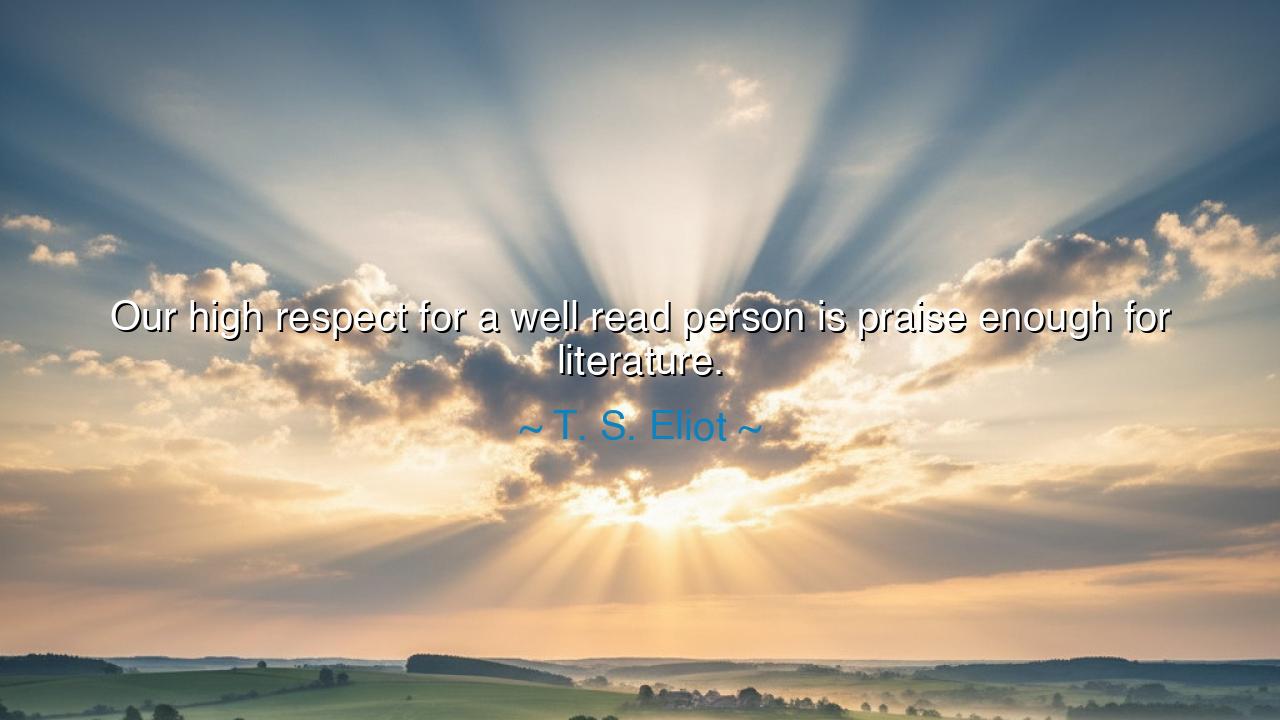
Our high respect for a well read person is praise enough for






In the profound words of T.S. Eliot, “Our high respect for a well-read person is praise enough for literature,” we hear a truth that speaks to the very soul of knowledge and human connection. Eliot, a poet and philosopher, understood that literature is not merely a collection of books, but the living thread that binds past and present, heart and mind. To be “well-read,” in his eyes, is not to have memorized facts or collected titles, but to have allowed the words of the great masters to penetrate and transform the very being of the reader. It is this transformation—this alchemical change—that is the true praise of literature.
The origin of this quote can be traced to Eliot’s own lifelong engagement with literature, which he viewed not as an academic exercise, but as a means of transcending the limits of personal experience. In a world increasingly obsessed with the immediate, where technology and fleeting trends dominate, Eliot offers a counterpoint: true wisdom, true respect, is reserved for those who have lived deeply through the written word. A well-read person, for Eliot, does not simply pass through the pages of books; they inhabit them, they converse with them, and in turn, they become enriched by the ideas and emotions that swirl through the ages.
The ancients, too, held literature in high esteem. Consider Plato, who in his dialogues spoke of the philosopher as one who seeks truth through reason and understanding, but also through the stories of the past. To the Greeks, literature was not simply an entertainment, but a guide to virtue, a mirror in which to see the soul reflected and refined. In the same way, Eliot understood that a person who imbibes the wisdom of many voices is one who has learned not only facts, but wisdom, the kind that endures through the ages. The well-read person, in this light, is not simply learned but transcendent, able to see beyond the mundane and into the eternal truths that underlie human existence.
There is a timeless quality to this view of literature. Think of Socrates, who, though he left no written record, engaged in conversations that would shape the philosophy of generations. The true philosopher, he taught, is one who seeks knowledge not for its own sake, but to serve humanity. In this, literature too plays a role. It is the harbinger of transformation—the means by which we gain access not only to other minds but to other realms of being. Shakespeare, in his plays, delves into the very core of human nature, while Homer takes us through the heroic struggle of mortals against gods. Through these texts, we enter the minds of giants and see our own world anew.
Consider the life of Walt Whitman, whose writings offered a new vision of humanity and the American spirit. Whitman’s respect for literature was not merely academic but profoundly democratic—he saw in each reader the potential for liberation. His respect for the written word led him to understand that to truly read is to engage in an act of self-discovery. Literature, for him, was an opportunity to explore the deepest corners of the self and the nation. When Eliot speaks of the "well-read person," he refers to someone who has not only consumed the written word but has allowed it to shape and define their existence.
In our modern world, where information is at our fingertips and books are often consumed in quick bursts, Eliot’s call to reverence for the well-read person stands as a reminder: depth matters more than breadth. To read well is not simply to read much, but to read with purpose and understanding. True respect for literature is not found in the size of one’s bookshelf but in the depth of one’s engagement with it. A person who has wrestled with the great minds of history, who has allowed words to shape their thoughts and hearts, is one who carries within them a legacy that no passing trend can erase.
The lesson to be drawn is this: seek the wisdom of the ages and read not for entertainment, but for enlightenment. Let your books be companions, not possessions. Just as a sculptor chisels away at marble to reveal the form within, so too must we chisel away at our own understanding, seeking the truth and beauty that lies beneath the surface. In this way, we can live in the world, but we can also live beyond it—through the immortal words that have shaped the world. Respect for literature is not the mere accumulation of knowledge, but the deep transformation of the self. When we read deeply and thoughtfully, we participate in a legacy of wisdom, which transcends time and place.
In closing, let T.S. Eliot’s words guide us forward: to read is to grow, and to grow is to become part of the eternal dialogue of human experience. Be well-read not only in books but in life, allowing the great stories to shape your understanding of the world and your place within it. And, in doing so, you will earn the highest praise of literature itself—not through mere recognition, but through a life that echoes with the wisdom of the ages.






AAdministratorAdministrator
Welcome, honored guests. Please leave a comment, we will respond soon